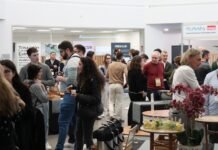AIMPLAS has coordinated a project to develop new sustainable packages extending the shelf-life of cheese and fresh pasta within the framework of the European project BIO4MAP. The result has been a new generation of barrier, multilayer and transparent packages with a cost 25% lower than conventional ones, with a lower environmental impact and a lower carbon footprint, up to 29%. The combination of different layers of bioplastics (PLA, PVOH and adhesives) and a wax coating obtained from olive leaves, has made possible obtaining packages suitable for containing packaged food in modified atmosphere, insulating the product from oxygen and humidity in order to avoid the growth of bacteria and fungi.
With regard to PLA, it is an easily recyclable material with excellent mechanical properties, and PVOH provides a barrier to gases and is water-soluble, so it disappears in the washing process, thus allowing recycling PLA. Both layers are joined by innovative biodegradable adhesives, while a wax coating made from olive leaves provides a water vapour barrier.
This coating, which does not disappear in the washing process, acts like a plasticizer for PLA, thus improving its flexibility. They are materials that, together, have a carbon footprint 57 % lower than the footprint of materials traditionally used in packaging manufacturing to contain this kind of food.
The Project BIO4MAP is funded by the European Union’s Seventh Framework Programme, managed by the Research Executive Agency (REA) and has a duration of 30 months and a
budget of 1.5 million Euros. Among the partners of this project are the intersupplier of Mercadona, Central Quesera Montesinos, a potential and user company of the new packages for goat cheese slices. Similarly, some Spanish companies are also taking part in the project, such as Vallés Plàstic, which is responsible for applying a new coating made of natural waxes and Artibal, a manufacturer of waxes, lacquers and inks, which is responsible for its formulation.











